Le Palais de Théodoric Ravenne
English Translation
Photoscope Walk Around ICI HERE
per mio Zio Luciano
Ce monument de Ravenne est énigmatique à plusieurs titres car sa destination initiale est encore inconnue de nos jours
Palais royal Eglise Bâtiment administratif
La confusion des genres vient des certains éléments comme la mosaïque de San Appolinare in Classe qui représente un palais du Roi Ostrogoths Théodoric qui a régné et vécu à Ravenne
.jpg) |
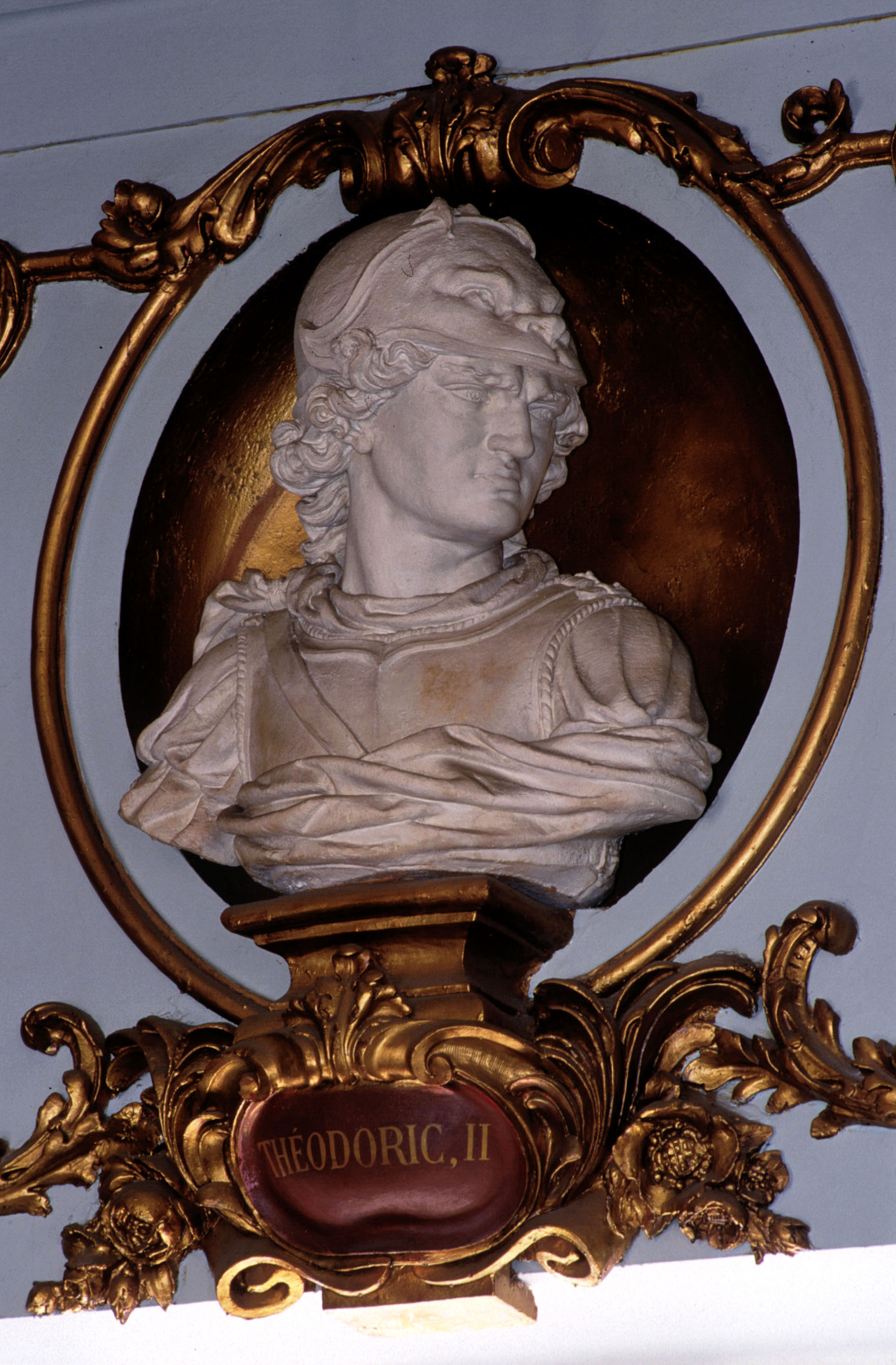 |
| Théodoric II |
Théodoric II (Toulouse) |
Que penser de ce monument ?
Palais royal ?
Si nous connaissons le cérémonial de la cour et les insignes impériaux mis en lumière à travers les textes des panégyristes et les documents officiels le cadre matériel qui sert de théâtre à la liturgie aulique n’est pas encore clairement défini
Nous sommes au haut Moyen Age ( fin de l’empire Romain est daté de 476 ap JC) bien après le règne de Constantin (272 337) vers l an 500
Cet empereur a était un des dernier grands empereurs Romains et il a mis au point tout un cérémonial de cour .Ce cérémonial a influé sur la construction d’un type de bâtiment la Basilique
Certes la Basilique existait bien avant Constantin mais sous son règne elle a été adapté aux cérémonial de cour
Que pouvons nous dire de la basilique constantinienne selon nos connaissances actuelles
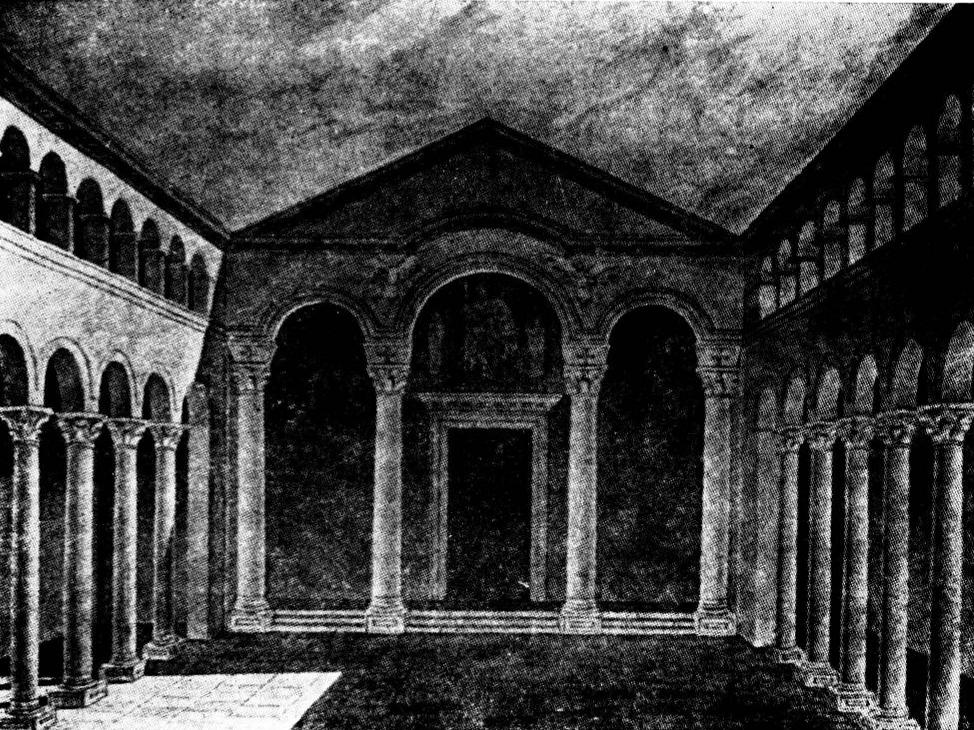 |
| Basilique Hypêthre pour cérémonie |
La basilique est
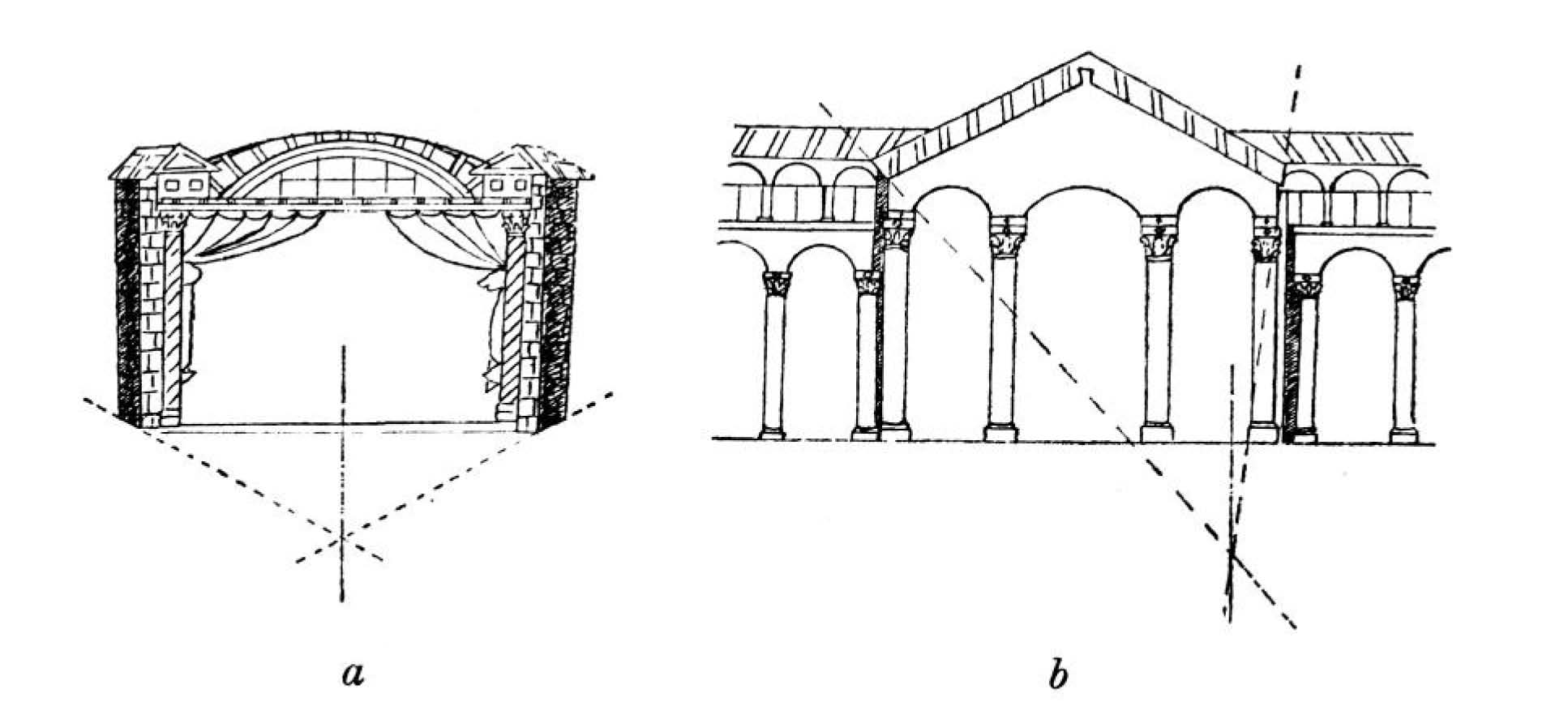 |
| Basilique |
1e un espace découvert bordé de portiques et servant à la présentation du souverain à la foule, parfois appelé basilica discoperta Cet espace deviendra l’ atrium ou la nef des basiliques chrétiennes.
2° un porche triomphal à trois baies inégales, surmontées d'un frontone glorificante qui correspondrait à la façade ou à l'arc triomphal de la antique basilique latine
3° la salle du trône, se terminant de préférence par une abside où le siège royal occupe l'emplacement qui deviendra celui de l'autel dans l'église chrétienne.
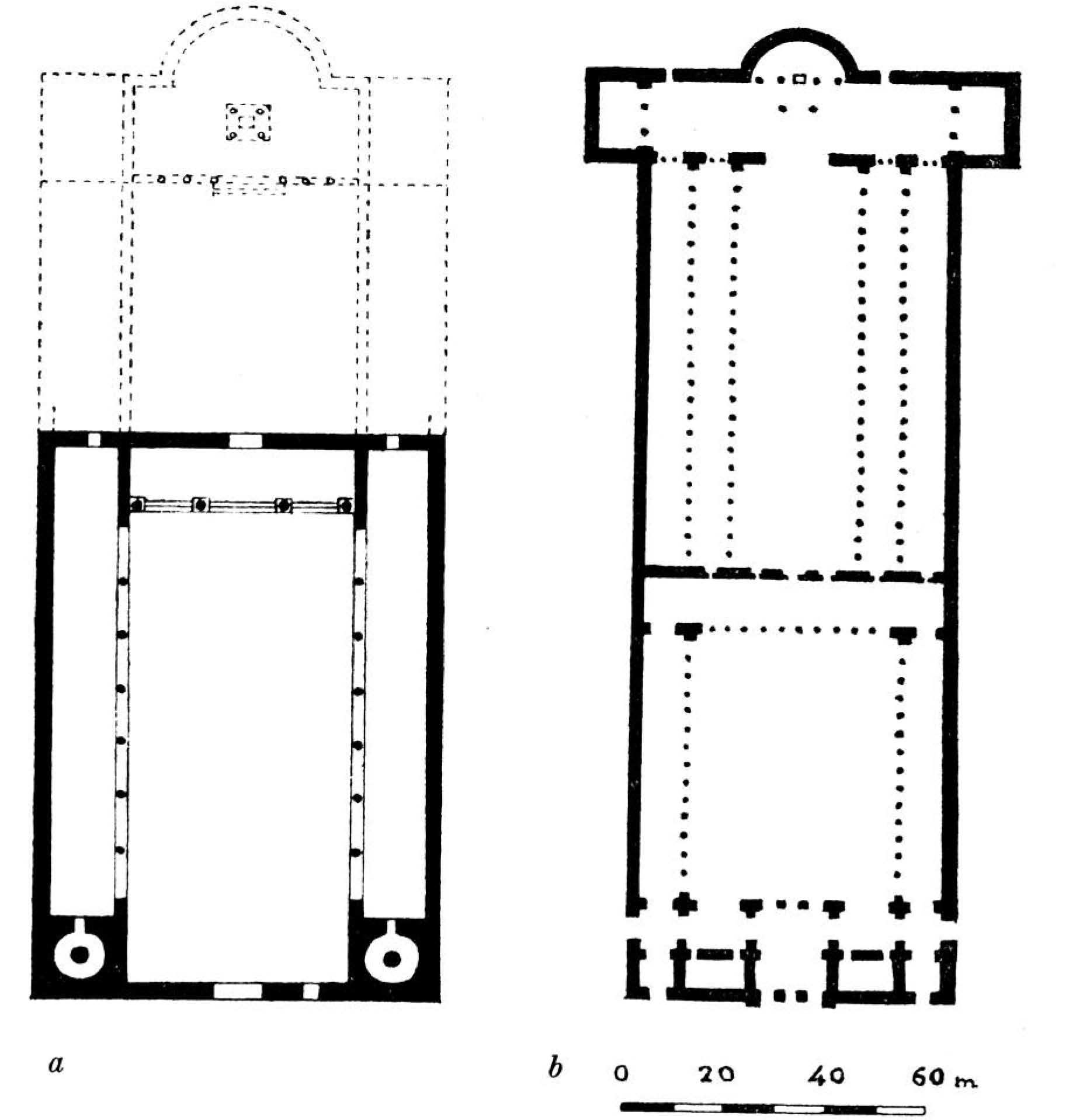 |
| Plan Type de Basilique |
Si les palais du Bas-Empire ont à peu près tous disparu nous avons par chance quelques exemples qui nous ont parvenus à nous comme à Trêves ou Split (Spalato ) et peut être le Ravennatum Palatium Sacrum ou palais de Théodoric à Ravenne.
Les témoignages sur le palais de Théodoric de Ravenne ne sont pas légion
Nous savons par les textes antiques notamment le texte de Gassiodore Variae, I, 6, relatif à la Basilica Herculis que Théodoric a fait construire par des ouvriers romains une Basilica Herculis qui serait la salle de culte monarchique dans la tradition impériale romaine
Mais nous avons aussi un témoignage pictural avec la représentation du palais sur une Mosaïque de San Apollinare Nuovo
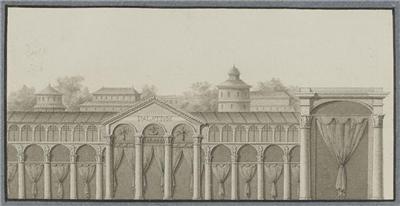 |
.La célèbre mosaïque ne représente pas, comme on serait tenté de le croire, une façade, mais trois côtés d'une cour à portiques car l’'artiste, abandonnant les règles de la perspective classique, a aplani le dessin
Cette mosaïque représente la basilique hypèthre pour cérémonies du palais de Théodoric, c'est-à-dire l'endroit (tribunalium) où le souverain apparaît en majesté à la foule qui ne peut entrer dans la salle du trône. Le porche à trois baies inégales situé au fond de la cour sert de cadre à cette apparition. Il donne accès à la salle d'audience proprement dite qui n'est pas représenté sur la mosaïque. Ainsi, la mosaïque permettrait de reconstituer l'aspect exact de la partie centrale du palais de Ravenne en plan et en élévation L’artiste a même inscrit au milieu du fronton le mot PALATIUM .
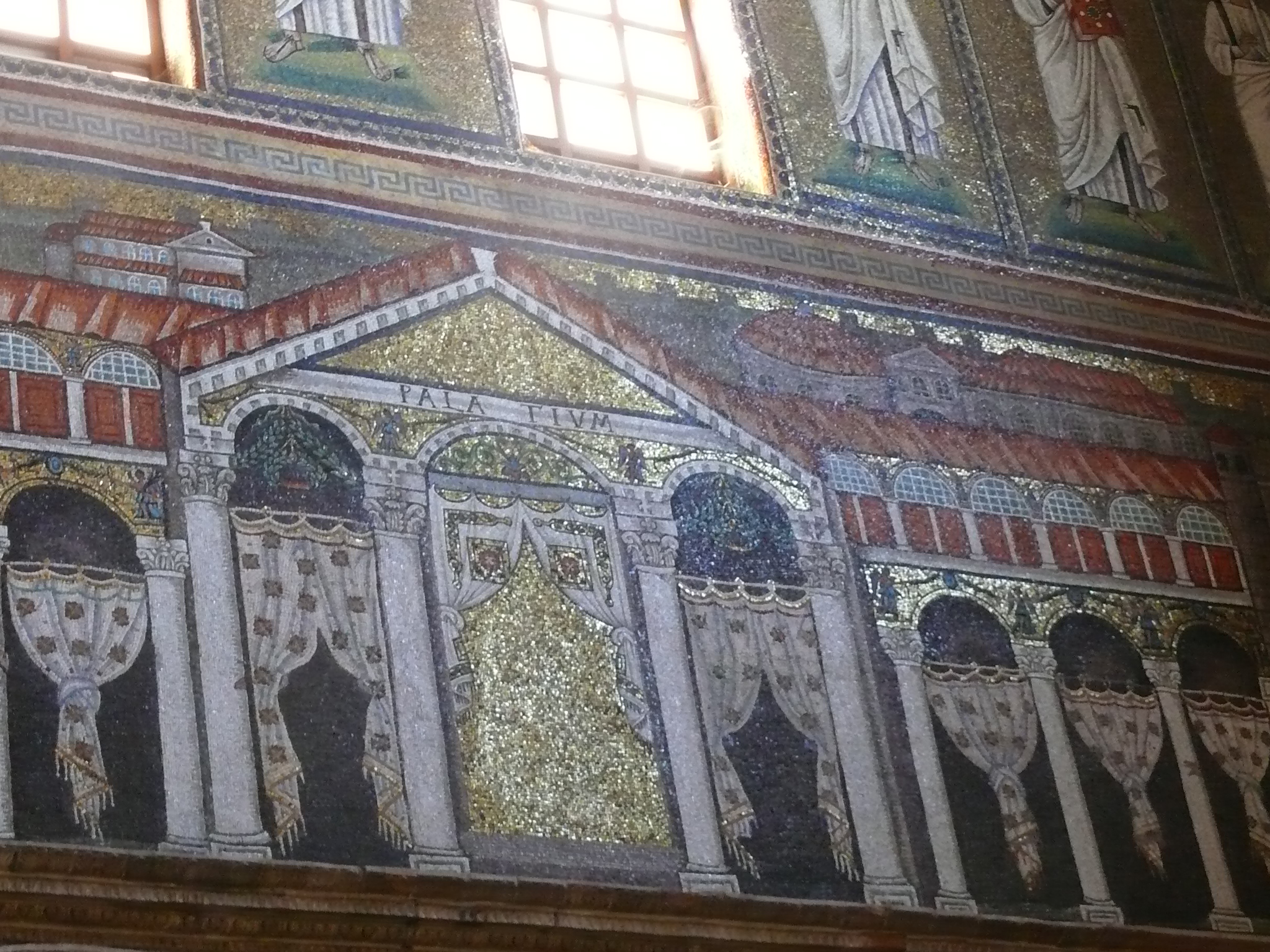 |
La mosaïque a subit des transformations depuis le moment où elle a été composée pour orner l'église palatine de Théodoric. A l'origine, les arcades abritaient des personnages dont on reconnaît facilement les contours. Il subsiste même des mains qui mordaient sur les colonnes voisines
La scène devait à l’origine montrer le roi goth trônant au centre de la salle au milieu des membres de sa cour qui levaient le bras dans le geste traditionnel de l'acclamation.
De plus il ne faut pas oublier que le décor de la nef de San Apollinare Nuovo a subi une seconde mutilation importante au XVIe siècle, lorsque on a exhaussé les colonnes de plus d'un mètre ,diminuant d'autant le mur que supportaient les arcades. Le tableau qui nous occupe a été respecté pour l'essentiel, mais des éléments n’ont-ils pas disparu comme par exemple un escalier ou des inscription ,d’autant qu’ au-dessus des fenêtres des ailes, les guirlandes sont interrompues par la toiture. . En même temps qu'on procédait à l'enlèvement des figures des arcades, on supprimait dans le fronton un deuxième motif qui a été identifié en général avec une reproduction du portrait équestre de Théodoric décrit par Agnellus
Et l’inscription PALATIUM comporte un mystère Ce secteur a-t-il été lui aussi remanié?
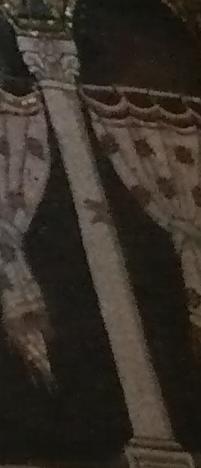 |
| Disparition d'un personnage il reste la main |
On serait porté à le croire en observant les guirlandes qui semblent coupées par le bandeau alors qu'elles pourraient se rejoindre, comme elles le font normalement au-dessus de plus le nom PALATIUM présente en son milieu un espace assez inexplicable
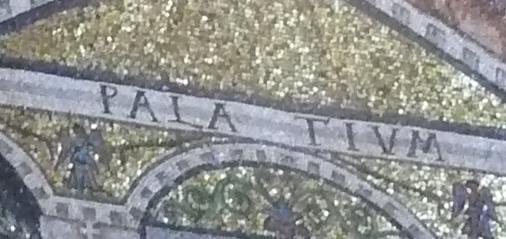 |
Conclusion
Le mosaïste n'avait pas comme souci principal de reproduire un aspect précis du palais de Théodoric. Il voulait, d'une part, symboliser un monument de la ville de Ravenne, et il l'a fait sans se réoccuper à l'excès de la vérité Il a cherché à créer un décor majestueux pour figurer le roi goth et sa cour dans toute leur gloire.
L'identification du monument avec le palais des exarques n'est qu'une conjecture. Depuis la fin du XIXe siècle, on a abandonné l'appellation traditionnelle de « Palais de Théodoric . Mais la solution d'un édifice civil a été encore défendue
C’est un secretum ou secretarium, une salle d'audience ou d'un bâtiment administratif de Théodoric ou des Exarques . On a parfois tiré parti de ce passage pour donner le nom de Sicrestum à la ruine Les noms de Sicrestum et de Ad Chalchi ont été transmit jusqu’au Moyen âge
Toutefois, une autre interprétation est beaucoup plus vraisemblable
Celle de la façade l'entrée de l'église San Salvatore dont parle Agnellus et dont de nombreux documents médiévaux précisent l'emplacement de cette église qui a été abandonnée au XVIe siècle
Palace of Theodoric, Ravenna
This monument of Ravenna is enigmatic in many ways since its original destination is still unknown today
Royal Palace Church Administration Building
The confusion comes from things like the mosaic in San Appolinare class that represents a palace of Ostrogoths King Theodoric who ruled and lived in Ravenna
.jpg) |
 |
| Théodoric II |
Théodoric II (Toulouse) |
What about the monument
Royal Palace?
If we know the ceremonial of the court and the imperial insignia highlighted through the texts of official documents and panegyrists part of equipment used in the liturgy courtly theater is still not clearly defined
We are in the High Middle Ages (End of the Roman Empire is dated to 476 AD) even after the reign of Constantine (272 337) in 500
Constantin emperor was one of the last great Roman emperors and has developed quite a court ceremony. This ceremony has influenced the construction of a building type Basilica
Certainly existed long before the Basilica of Constantine, but his reign has been adapted to the court ceremony
What can we say of the Constantinian basilica as we now know
 |
| Basilique Hypêthre for ceremonies |
The basilica is
First an open space surrounded by porticos and used for the presentation of the sovereign to the crowd, sometimes called basilica discoperta This space will become the atrium or the nave of the Christian basilicas.
2 ° a triumphant three-bay porch uneven, surmounted by a pediment glorificante corresponding to the front or the arch of the ancient basilica Latin
3 the throne room, preferably ending in an apse, where the royal seat occupies the site will become one of the altar in the Christian church.
If the palace of the Byzantine Empire have almost all disappeared by chance we have some examples that we have come to us as in Trier and Split (Spalato) and can be Ravennatum Palatium Sacrum or palace of Theodoric in Ravenna.
The testimony on the palace of Theodoric in Ravenna are not legions
We know from ancient texts including the text of Gassiodore Variae, I, 6 on the Basilica Herculis that Theodoric was erected by a Roman Basilica Herculis workers who would be the hall of worship monarchical tradition in Roman imperial
But we also witness a pictorial representation of the palace with a mosaic of San Apollinare Nuovo
 |
. Celebrates the mosaic is not, as one would be tempted to believe, a facade, but three sides of a courtyard with porticoes because'artiste, abandoning the traditional rules of perspective, flattened the design
This mosaic represents the basilica hypèthre ceremonies for the Palace of Theodoric, that is to say the place (tribunalium) where the sovereign majesty appears in the crowd who can not enter the throne room. The three-bay porch uneven at the bottom of the courtyard is the setting for this appearance. It provides access to the courtroom itself, which is not represented on the mosaic. Thus, the mosaic would reconstruct the exact appearance of the central part of the palace of Ravenna in plan and elevation, the artist has even entered the middle of the pediment the word PALATIUM consortium.
 |
The mosaic is being transformed from the time she was made to adorn the church palate of Theodoric. Originally, the arcades of the characters that are easily recognizable contours. There are still biting the hands that even the neighboring columns
The scene was originally intended to show the Gothic king enthroned in the center of the room in the middle of the members of his court who raised their arms in the traditional gesture of acclamation.
Moreover we must not forget that the scenery of the nave of San Apollinare Nuovo has undergone a second major mutilation in the sixteenth century, was heightened when the columns of more than a meter, thereby decreasing the wall that bore the arcades . The table before us has been respected for the most part, but elements do not they disappeared such as stairs or registration, so far as above the windows of the wings, garlands are interrupted by the roof.
.jpg) |
| Character disparition Remain only the hand |
. At the same time we proceeded with the removal of the figures of arches were deleted in the pediment a second pattern that was generally identified with a replica of the equestrian portrait of Theodoric described by Agnellus
And registration includes a mystery palatium This sector has also been redesigned? One would believe watching the wreaths that seem cut by the band when they could meet, as they normally do over again the name palatium this space in the middle quite inexplicable
 |
Conclusion
The mosaic had no major concern as to reproduce a specific aspect of the Palace of Theodoric. He wanted, first, a monument symbolizing the city of Ravenna, and he did not have to reoccupy the excess of the truth he has sought to create a majestic backdrop to include the Gothic king and his court in all their glory.
The identification of the monument with the Palace of exarchs is only conjecture. Since the late nineteenth century, it abandoned the traditional name of "Palace of Theodoric. But the solution of a civic building was still defended
It is a secretum secretarium or a courtroom or an office building or Exarchs Theodoric. It has sometimes taken advantage of this passage to give the name of the ruin Sicrestum names Sicrestum and Ad Chalchi were transmitted to the Middle Ages
However, another interpretation is much more likely
That of the front entrance of the church of San Salvatore speaks Agnellus which many medieval documents specify the location of this church that was abandoned in the sixteenth century






.jpg)

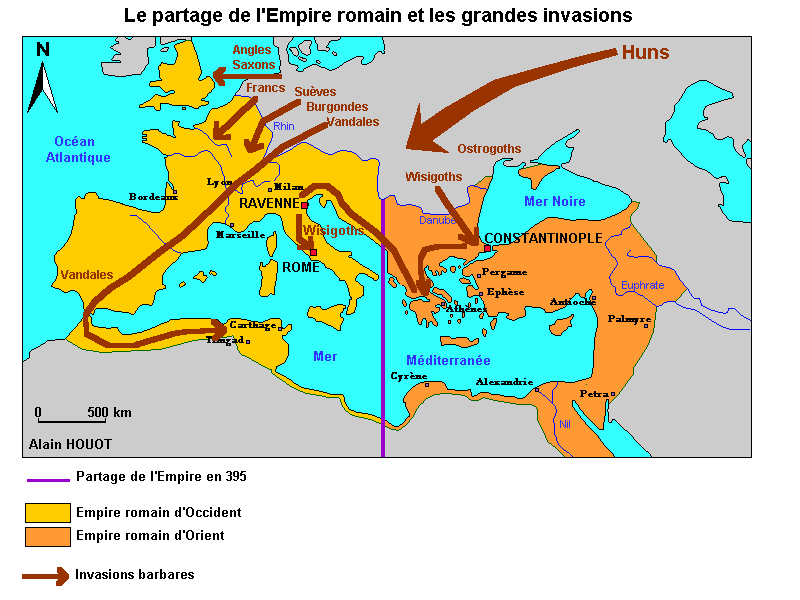

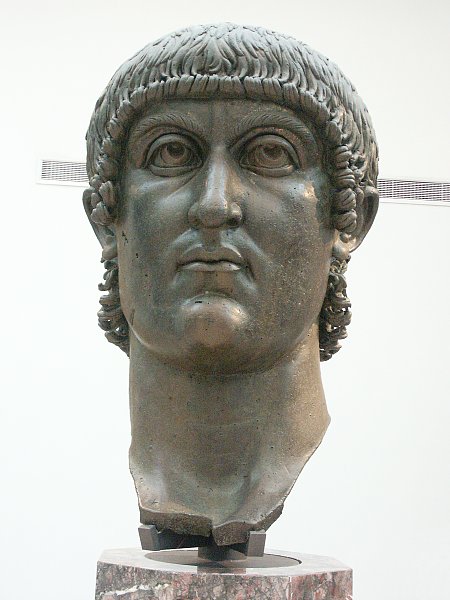



.jpg)
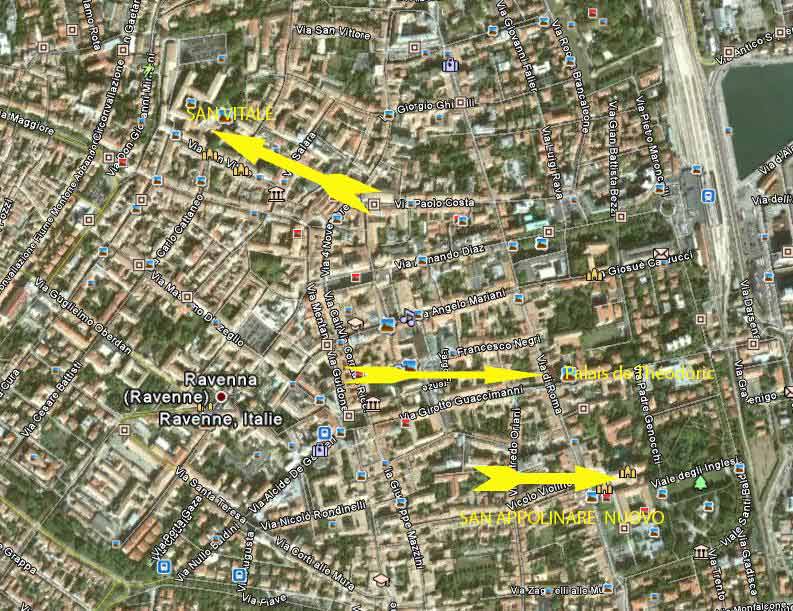
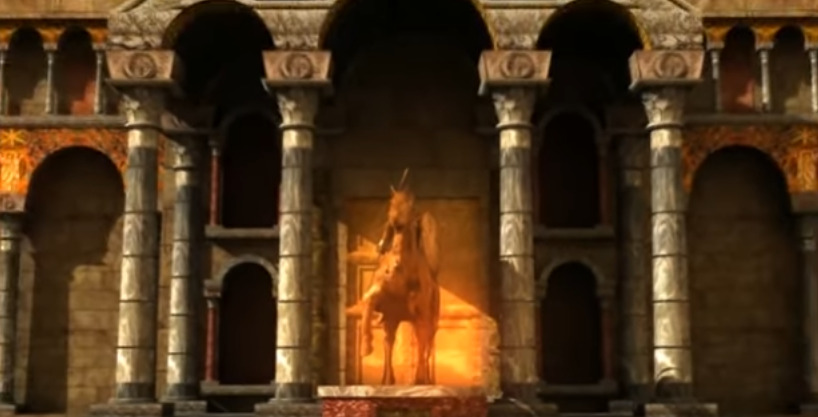
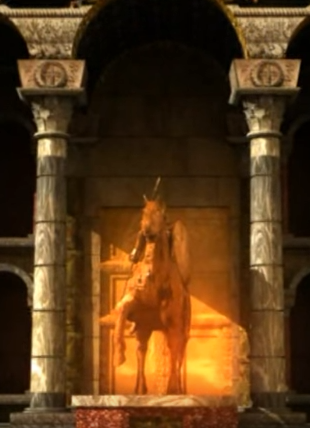
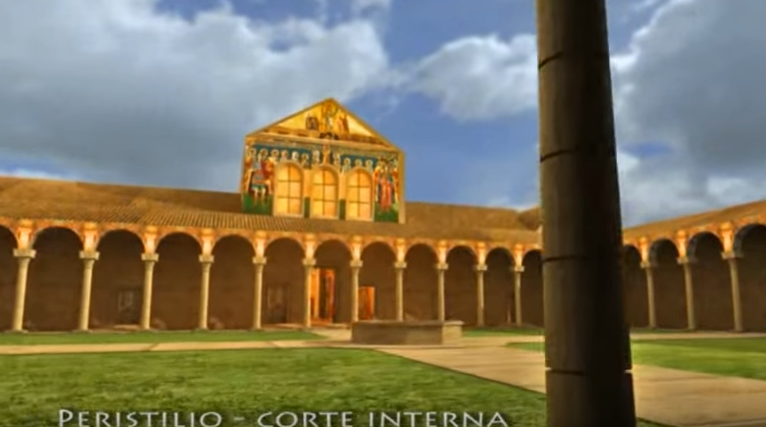
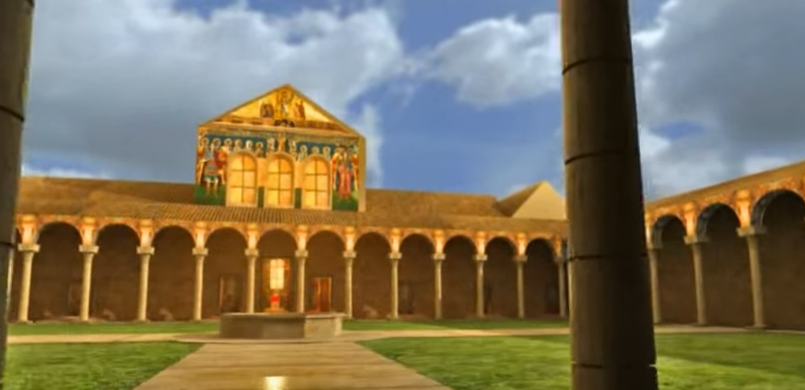
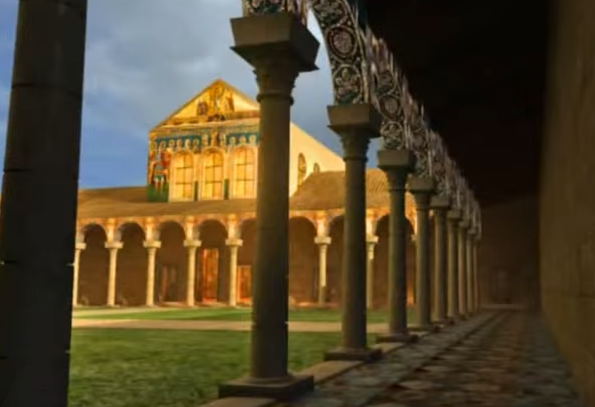
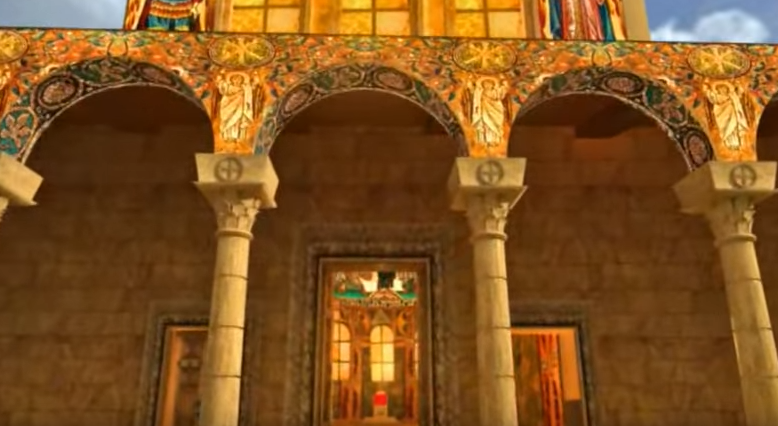

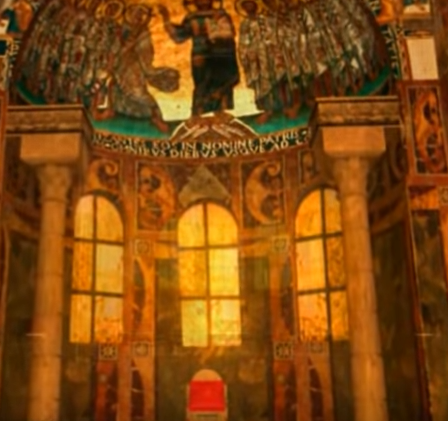
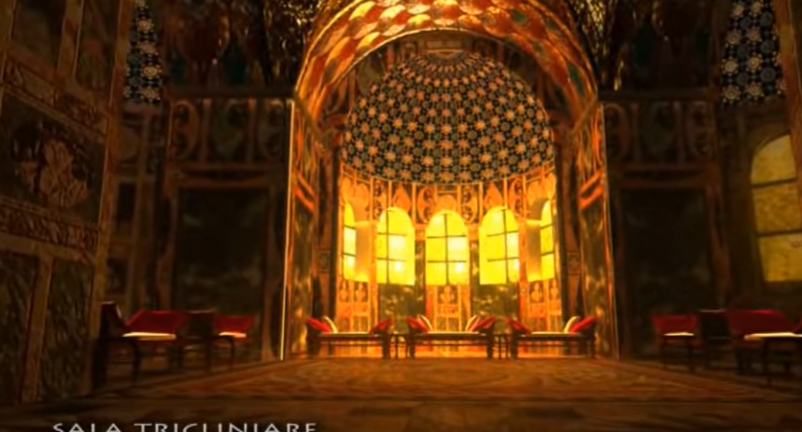
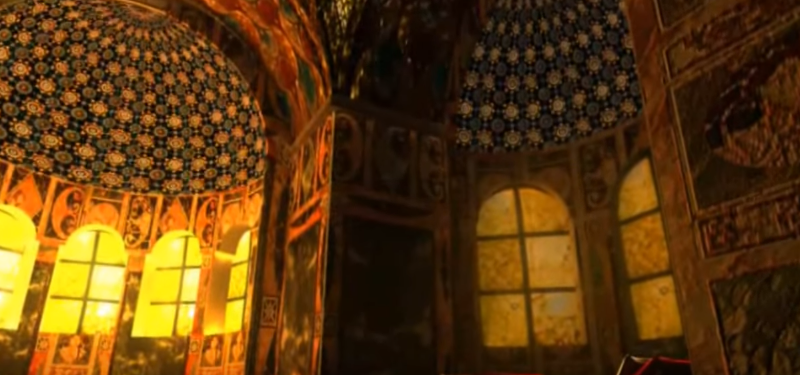
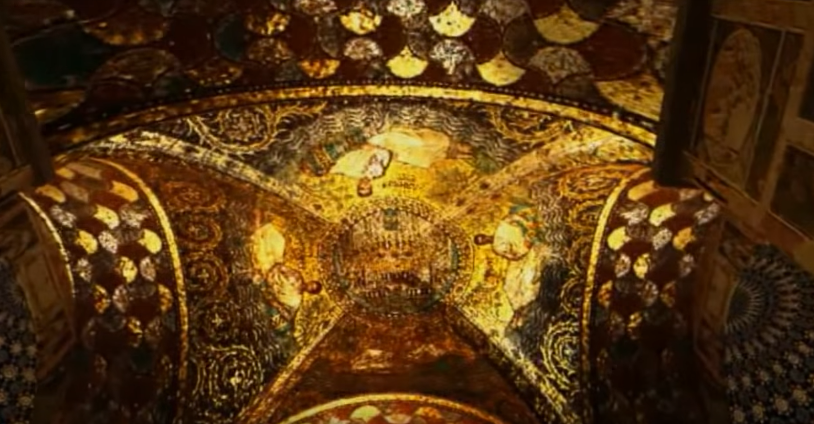
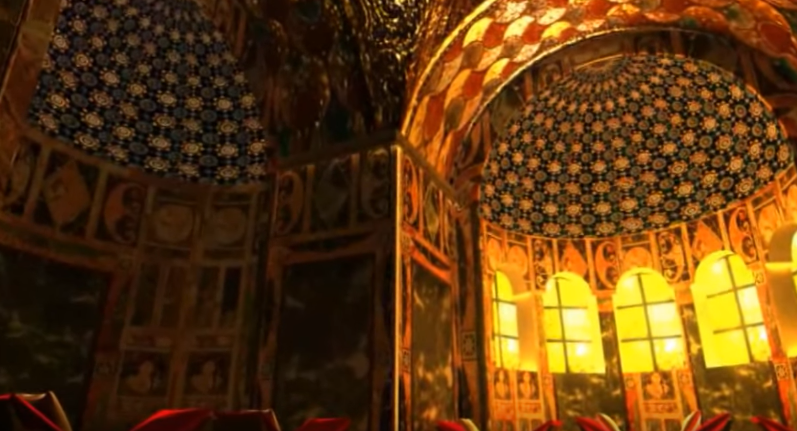
.jpg)